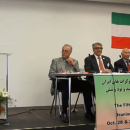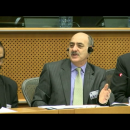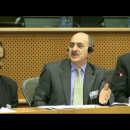Watergate undermined Nixon’s 1974 Middle Eastern mission, with far-reaching consequences.
2017 Donald Trump in Saudi Arabia
JERUSALEM — In late spring of 1974, Washington newspapers were crammed with headlines about Watergate and impeachment. But President Nixon was 6,500 miles away in Saudi Arabia, in the middle of an ambitious 10-day, seven-stop foreign trip.
His ill-fated mission — derided by critics as “impeachment diplomacy” — holds a lesson for President Trump: While successes in foreign policy can help distract from troubles at home, domestic problems can also spill over into foreign policy and have long-reaching consequences.
“Though incumbent presidents don’t like to admit it, their domestic travails — and their scandals in particular — can seriously impact their ability to conduct an effective foreign policy,” says historian Andrew Scott Cooper, author of The Oil Kings: How the U.S., Iran, and Saudi Arabia Changed the Balance of Power in the Middle East. “Leaders in the Middle East are no doubt studying President Trump’s difficulties and trying to gauge how far they can push him and what they can get away with.”
Presidents often turn to foreign policy when there’s trouble at home. Nixon made just one foreign trip in 1973, but visited 10 countries in the months before his resignation in 1974. Ronald Reagan met with Pope John Paul II in the midst of the Iran-Contra hearings in 1987. Bill Clinton visited Israel and Palestinian territory even as the House considered impeachment in 1998.
Trump’s Russian controversy comes much earlier in his presidency — a time when most presidents are still focused on getting a domestic agenda through Congress. And while the imbroglio has yet to reach a Watergate-like roar, talk of impeachment has reached a steady murmur.




































